If you’re new to bible study, it can be intimidating, difficult, and perhaps a bit overwhelming. But Bible study is not only for spiritual leaders or pastors—it’s for everyone who wants to know the God of the Bible better. But with so many options, it’s hard to know where to start. So what are some things you can do?
In this blog post, we’ll talk about 12 steps you can take to study the bible that will help you get started and find confidence as you read God’s word. Before we get to the tips and tricks, let’s set a good foundation.
What is the Bible?
The bible is the best-selling book of all time, with more than 3 billion copies in circulation today. The bible’s ultimate Author and source of inspiration is God, who uses it to reveal Himself to us. According to the United Bible Societies, the Bible has been translated (in whole or part) into more than 3,324 languages.
This collection of 66 books is divided into two groups: Old Testament (Genesis to Malachi) or before Christ’s coming to earth; New Testament (Matthew to Revelation) after Jesus came.
With more than 300 references to Jesus Christ in the 39 books of the Old Testament, it is often referred to as “Jesus concealed,” while the New Testament with its 27 books is referred to as “Jesus revealed.”
Written by 40 different authors in three different languages on three different continents over a 1,500 year period, the Bible is one story of God’s redemption through His Son, Jesus Christ.
RELATED: How To Choose The Best Bible: Everything You Need To Know
Why should we study the Bible?
- Knowing who God is and how He interacts with people.
- Gaining wisdom and direction for your life.
- Understanding Bible passages that have been confusing to you in the past.
- Feeling more peace about your struggles because of biblical stories on those topics.
- Knowing how to share your faith with others.
- Being an example of Christ in the world by the sanctifying knowledge of Jesus Christ.
- Being aware of false teachers and teachings that are so prevalent in our world.
- Learning how to pray.
- It’s the source of truth, telling us if something is right or wrong.
- Providing guidance on every aspect of life from family relationships to raising children.
God for guidance in understanding His Word more fully (check out Psalm 119).
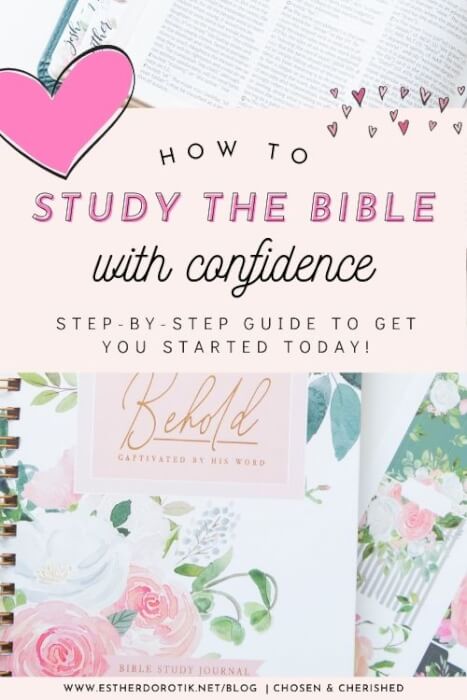
What do you need to get started studying the Bible?
The bible is the most important book you’ll ever read, so here are a few helpful items on how to get started with bible study today.
- A bible. There are many different translations and bible styles that have different focuses (e.g., ESV, study bibles, life application bibles, keyword bibles). I highly suggest one that includes cross-references (discussed below).
- A journal. You’ll want to write down thoughts, observations, and questions as you study the Bible. This will help keep your work organized in a binder or notebook. You can use a simple notepad or a guided Bible study journal.
- Pens, highlighters, and post-it notes. Tip: most Bibles have thin pages, so make sure your bible pens and highlighters don’t bleed through by testing a small spot first.
- Concordance. Though this is optional, a concordance is a beneficial tool. You can use the concordance to find specific words in the bible and see where those words are used in other bibles passages. Some Bibles also include cross-references showing where verses are used or relate to other parts of the bible.
- A good attitude and a willingness to learn new things about God’s word!
Additional Tools for Inductive Bible study
These additional items are great tools to add as you engage Scripture and become more comfortable in your personal study.
- Books on studying the Bible: these books are written specifically for studying scripture and will provide helpful tips to dive deeper into Scripture.
- Bible handbooks: these resources will help with basic interpretation of scripture and offer suggestions for how best to study different topics like spiritual disciplines.
- Bible Maps/Atlases: to help you visualize where various biblical events took place and provide more information about the people. Some atlases also include important sites and informative charts.
- Commentaries: to provide you with an understanding of what the Bible says. Because commentaries come from one person’s perspective, reviewing more than one source is always good. There are also great cultural background commentaries that really open up the meaning of the Word.
- Dictionaries and Encyclopedias: to help you understand various words, places, events. Arranged in alphabetical order, these are a perfect place to go if you’re looking for info about the topic referenced in your passage.
- Study Bible Software: it is always good to have a study bible software that will allow you to search for verses on any topic or word in the Bible. I use a paid version of Logos, but they also have a free version that’s a great place to start.
12 Tips On How to Study the Bible for Beginners
While I’m a huge supporter of memorizing Scripture, the goal of studying the Bible should be understanding it, not just memorizing sentences that make sense but don’t have noticeable differences to your life. When you understand what something means, instead of having someone tell you its meaning, it’s much more powerful! That’s why you need to know what you’re looking for when reading the bible. This leads us to the first tip:
1 | Prayer Is Essential for Bible Study
A good bible study should always start with prayer. Prayer is a powerful and essential step allowing the Holy Spirit to guide you as you read His Word. The Bible contains writings not taught by human wisdom but by God’s Spirit (1 Corinthians 2:13). His Spirit within us “highlights” the text, allowing us to understand the meaning and application. Here are a few Bible verses you can pray before beginning each Bible study.
- Start by asking God to open your eyes to the wondrous things found in His Word (Psalm 119:18).
- Be sensitive to its truths, and rightly divide (or handle) the Word of God (2 Timothy 2:15).
- Allow Him to teach, correct, and train you in righteousness, so that you can be complete, fully equipped for every good work. (2 Timothy 3:16).
- Seek the dividing Word of God to separate between the thoughts and attitudes of your heart (Hebrews 4:12).
If the idea of prayer is new for you, I’ve been there! Here are 80 Bible Verses on Prayer that will expand on why you should pray, how you can pray, and the benefits of prayer. There’s also a free Bible study on how to be still and pray in my Chosen Library. Just sign up for the newsletter and download yours today!

2 | Create A Committed Plan For Yourself
I’ve found that having a specific idea of where you’re going is really helpful, especially for those new to the Bible study. Create a detailed plan: write out your goals, your methods, and your expectations. The questions below will help you create a plan for studying the Bible practically, intentionally, and effectively.
- Expectations: What exactly do you want to accomplish during each bible study session?
- Timing is everything: What is the most natural time each day for this activity? Do you wake up early enough to study before others are awake? Do you have off-hours, or can you identify windows of time that are most productive for you?
- Making room is essential: Is there something in your schedule that could be changed to free up time?
- Duration: How many minutes can you devote each day, and how will this fit into your schedule?
- Method: What are you going to read each day? Are you going to read specific books of the Bible? One chapter a day? Read through a certain part of Scripture – Old Testament, New Testament, Gospels? The entire Bible? (more on the method below)
- Looking Ahead: Determine how you can guard this time. Do you need to create a schedule or routine, so your family knows this is set-apart time? Will you need to turn off your phone or refrain from checking email and social media?
Related: 5 Ways The Enemy Fights Your Time With God
3 | Establishing A Reading Plan
A Bible reading plan can be as simple or complex as you want it to be. There are many different ways to read the bible, from choosing your own passages and chapters or following a plan set out by others. While any reading plan is better than nothing, I’ve included some below, along with why that particular plan is valuable. In the beginning, the biggest key is choosing a plan you can easily stick with.
- The Gospels – Matthew, Mark, Luke, and John are four narrative accounts of the life, teachings, and miracles of Jesus Christ. This is a great place to start understanding the significance of His redeeming work on behalf of fallen humanity.
- Psalms – The poetic book of Psalms houses beautiful hymns that people sang when they worshipped God, turning Old Testament theology into songs. This gorgeous collection conveys themes like adoration of God, cries for help, strength in weakness, trust instead of fear, sorrow over sin, and the importance of God’s word.
- Proverbs – Tucked between Psalms and Ecclesiastes, the book of Proverbs is a collection of wisdom for daily living covering a wide array of topics from work, friends, speech, and marriage. This book is a training manual for righteous living.
- Epistles – Comprised of 21 books by apostles, these letters were written to the New Testament believers as directions for Christ-like living. Filled with the supremacy of Christ, sound doctrine, practical advice for living, and warnings of false teachers, these books are meant to keep us anchored in Christ.
- Read the Bible in chronological order – This is how I now choose to read through God’s Word because you get a thorough overview of its storyline. Reading the Bible in the order in which it was written opened my eyes to many of my questions. I think about it like watching a movie from start to finish. You’re less likely to think, “What did I miss?”
These are just a few ways you can begin your study of God’s Word. Whatever route you take, the next tip is key.
4 | Stick To Just One
Study one book at a time, and read it from cover to cover before moving on. I can’t stress the importance of this enough. Consider when you read a novel. Unless you’re reading one of those stories enabling you to choose a route, you would never stop reading halfway through chapter 10 to jump midway through chapter 25. For the most part, the books in the Bible were written with a beginning, middle, and end and meant to be read as one continuous story.
5 | Read The Introduction
Many Bibles have an introduction to the book. The introduction will typically give you a general overview of what God expects from his people, how he wants them to behave, and some historical setting that helps put events in perspective. The purpose here is to understand where everything fits into biblical history and why it’s important enough to be included in the Bible’s canon of scripture. If your Bible does not have an intro or if you’re a visual person, the Bible Project has done an excellent job of putting together videos on the overarching theme of each book. Here are some of the great key items you will learn from the introduction:
- Author
- Recipient
- Date it was written
- Author’s intent or purpose for writing the book
- Key themes of the book
- Background history
- Outline of the book
- Literary Features
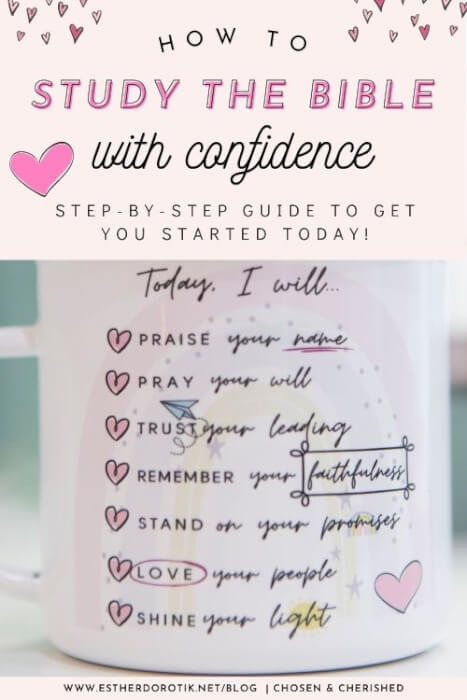
6 | How To Stay On Track With Your Bible Study
Keeping up with your bible study is a click away. The “A Lamp Unto” app is a must-have if you have a smartphone, allowing you to create adjustable tailor-made plans. Here’s where creating a commitment plan for yourself (point 2 above) comes into play. This app will motivate you to keep going! Once you’ve downloaded the app, here’s how to get started:
- Choose how long you want it to take. One year, 6 months, 4 weeks, 10 days…simply choose a reasonable time for what you’re reading.
- Select what you’re reading: full bible, Old or New Testament, or choose the books of the Bible you’d like to read.
- Depending on what you’ve chosen to read, you can read it in traditional order (Genesis to Revelation), chronological order (order in which it was written), or genre rotation if you’re reading the entire bible.
- Decide on the number of days each week you plan on studying. If you prefer not to study on a particular day, tap that day to unselect it.
- Adjust your reading time. Click on the “Mins/Session” to change your reading speed, or you can take a quick assessment to measure your reading speed.
- Hit create, and you’re ready to go!
- You can now see your daily reading schedule, stats and even change the settings (upper right corner).
- Each day as you check off your reading plan, your updated stats will show.
- Miss a day? No problem! Simply choose to catch up or extend the reading plan by a day.
- Send an invite code to others to join your reading plan.
7 | Keep Scripture In Context
Context, which can be defined as “the circumstances within which an event takes place,” is important for an accurate interpretation. It’s the place, time, or circumstance in which something occurs or develops, which influences the story’s meaning.
We wouldn’t read one wedding vow, one contract line, or just one aspect of job agreements, so we shouldn’t do that with the most important text ever written. Reading Scripture within the historical and social framework ensures the original meaning is not removed from the verses.
For example, suppose I asked you, “Do you want a dog?” The average person would interpret “dog” as a furry friend who might chew up your couch cushions or dig holes in your backyard. Now, what if I told you we were at a barbeque cookout? Within context, the meaning of “dog” would take on a completely different meaning. The same applies to reading the Bible. To keep the original meaning God intended, we must keep scripture within context.
8 | Use A Highlighting System For Bible Study
Use a highlighting system to gain a deeper understanding of the Bible. With many different types out there, make sure it suits your needs. Highlighting systems can also be used in conjunction with other methods of note-taking. Here are a few thoughts on how:
- Highlight words by theme (e.g., “goodness, love, sin, prayer, etc.”).
- Highlight only certain passages that relate closely to what you’re currently studying (e.g., the fruit of the Spirit).
- Emphasize specific lines with underlining.
- Mark important phrases as stars (*).
- You might want to highlight a verse that you’d like to memorize.
- Draw a box around commands.
- Circle key words in verses.
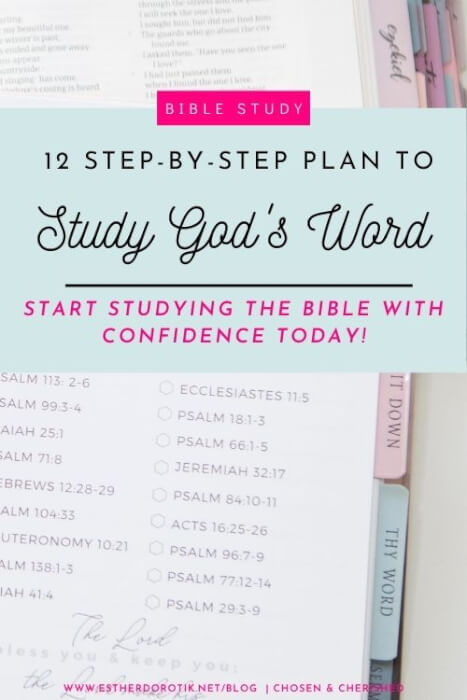
9 | Ask Questions As You Study the Bible
Questions are an essential part of Bible study and train us in critical thinking. Jesus often asked questions to get people thinking, desiring them to think critically about what they believed and why they believed it.
Questions open doors of opportunity for wider understanding, fruitful connections between Scripture and life, and deeper faith due to the answers. Questions are also valuable tools for finding out what information is missing to reach an accurate conclusion or solve a problem. This process of “questioning” often helps reveal new insights, allowing you to explore options without committing prematurely to any one option.
Here are some good questions to ask when studying the Bible:
- What are the circumstances surrounding the text?
- Why was this story told in the Bible?
- What do these passages reveal about God?
- What do they reveal about man?
- Are there any commands?
- Is there a promise? Is a command tied to the promise?
- What are some of the words that stand out to you when reading this passage?
- Is there any verse that stands out more than others while reading the passage as a whole?
- In what ways might we apply this Scripture to our lives today?
- Is there something I don’t understand about this section of Scripture? And, if so, is there someone who can help?
10 | Take Notes While Reading
During Bible study, don’t just read your Bible; grab an inductive bible study journal or notebook to write down your thoughts, insights, and questions about what you are reading in each chapter. Pay close attention to important details and key points to remember. These are some things to jot down:
- Questions (above) and any known answers
- Locations mentioned
- People involved
- Words to define
- Repeating words
- Promises, praises, and prayers
- Key Bible verses from the passage
11 | Make Connections Between Scripture and Life
It is important to make connections between scripture and life. While there is only one interpretation based on the author’s original intent, there are many life applications. Often, these applications vary based on your current situation. In order for us to grow, we must be open and willing to change.
- When you think about a passage, ask yourself how it applies to your own life.
- What does this verse tell me?
- How might I apply this in my Christian walk?
- What do I need to change/address because of this verse?
- How does this affect my relationship with God?
- How should it affect my relationship with others?
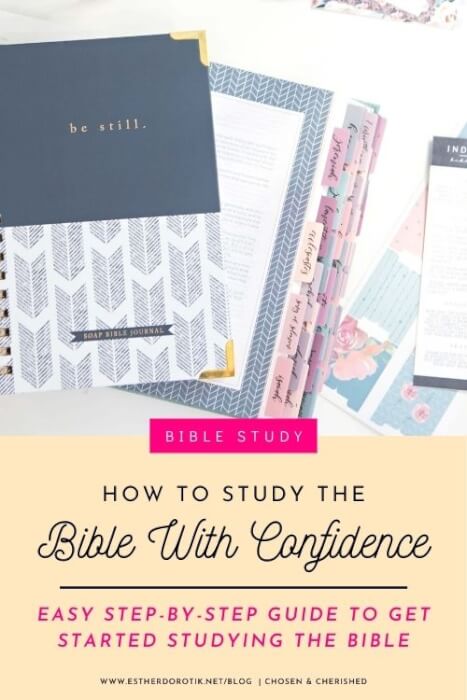
12 | Conclude Prayerfully With ACTS
Yes, I know we began with prayer, but Bible study should be sandwiched in prayer. Using the scripture you’ve read, turn what you’ve learned into prayer. ACTS is a simple way to focus on God and a great conclusion any Bible study.
- Adoration: Starting your prayers with praise centers your heart on God and reminds you that only He can answer your requests. The act of praising God draws you closer to him, keeping your mind focused on His character. Pause to praise God for the things your study has revealed about Him.
- Confession: This is a time of self-reflection. We have all sinned and fallen short of the glory of God. Confession restores a right relationship with Him by cleansing the soil of our hearts. Consider what sins you have committed, confessing anything these verses reveal in your life.
- Thanksgiving: Gratitude breeds humility by acknowledging the Giver of all things. Sincerely thank Him not only for your blessings but also for those of others.
- Supplication: While praying ACTS, ask God for your specific requests. Share what’s on your heart and where you need guidance, healing, provision, peace, or anything else. Also, pray about the needs others have shared with you, placing everything before His throne.
Related: How To Create A Prayer Strategy
I pray this post helps you see the need and benefits of bible study as well as simple steps to get you started. Remember, no one is perfect, and if we’re willing to try our best with what we have, God will reward us for it! If you find yourself struggling at first, don’t give up because so many great things come from studying His Word daily. When was the last time you opened up your Bible? What’s holding you back? Let me know in the comments below!
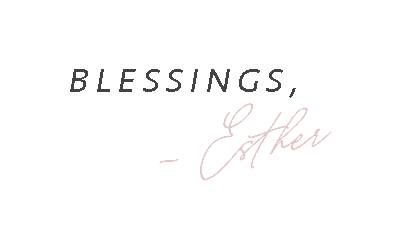

Thank you, Esther! You always have the most informative and helpful posts! ❤️
I struggle to know where to start. I don’t always understand what the meaning of things are either. But I can see how studying the background would help with that. Thanks!
I want so bad to study Gods Word i cannot comprhend what I read I’m so easily distracted by everything and by nothing. I’m so hungry and I am not in a church we live in a very small town and I know everyone and I’m not comfortable attending church with these people.
Try using YouTube to attend virtual church services!! I am in the same predicament but I found the amazing WALK church in Las Vegas that has a YouTube channel and live streams their services!! I highly recommend ❤️❤️
This really helped me